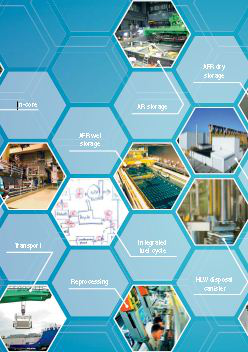Speaker
Mr
David Hambley
(National Nuclea r Laboratory)
Description
Worldwide, slow progress in the deployment of geological disposal facilities and reduced use of reprocessing has led to the need to increase the inventory and duration of spent fuel storage. This has led to a range of approaches to the management of spent fuel in storage being adopted in different countries. A review has been undertaken to identify learning from the different approaches adopted internationally with a view to informing decision making relating to spent fuel management.
The review surveyed current spent fuel storage and disposal practices, standards, trends and recent developments. National strategies for spent fuel storage and disposal in 16 countries were surveyed and more detailed studies were carried out into the evolution of spent fuel storage and disposal strategies and activities in 4 countries.
As far as spent fuel management is concerned, the review highlighted that:
• Spent fuel management should be aligned to national policy and strategies for the final dispositioning of the fuel.
• Given the long timeframes associated with geological disposal facility site selection and the management life-cycle associated with nuclear fuel, selection of national spent fuel storage arrangements should reflect the need for efficiency of delivery of the whole spent fuel management strategy; it should ensure unduly increased costs due to expedient short term focus are avoided.
• Commercial and financial arrangements should ideally be constructed to ensure that, at each stage of the spent fuel lifecycle, spent fuel management decisions do not unnecessarily preclude future management options. This will minimise the constraints placed on future fuel handling, packaging and disposal activities.
• Having the capability to allow for extended storage of spent fuel, either at reactor sites or at a centralised facility, potentially over periods of several decades, may give increased flexibility in the design of future packaging or disposal concepts.
On a technical level, very long-term storage of spent fuel over 100 years or more using existing technologies, or foreseeable evolutions of them, is technically feasible and credible. The use of multiple approaches to fuel storage, and continued evolution of the design of storage facilities, indicates that there is no single best storage technology and that local factors such as existing infrastructure, approach to fuel cycle management, existing experience/capability and short-term cash flow considerations all influence technology selection. Both wet and dry storage systems continue to receive regulatory approval and are generally considered to be acceptable.
Country/ int. organization
United Kingdom
Primary author
Mr
David Hambley
(National Nuclea r Laboratory)
Co-authors
Dr
Alice Laferrere
(National Nuclear Laboratory)
Dr
Steve Walters
(National Nuclear Laboratory)

